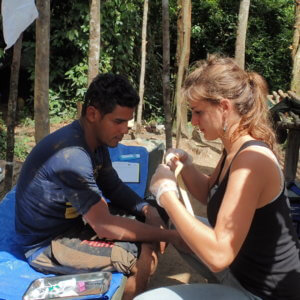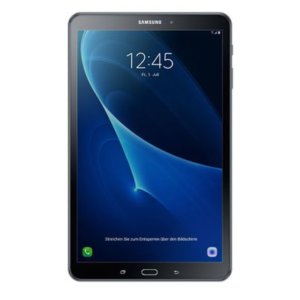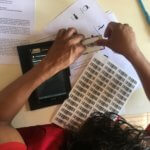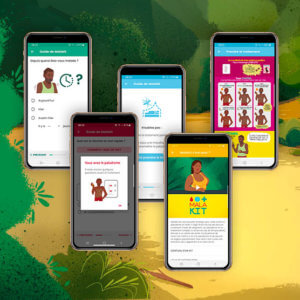Data collection tools
The collection and management of high-quality data to evaluate the Malakit strategy was challenging and required innovative methods. They are presented in this article.
Android tablets: go paperless
To collect study data, Malakit facilitators use electronic tablets instead of paper questionnaires. These tablets run Android and have a 7-inch screen, allowing for easier handling and longer battery life.
For participant training during inclusion visits, tablets are also used to display explanatory videos and demonstrate how to use the Malakit application.
All tablets are encrypted and remotely administered by the CIC with Miradore Online.
ODK Collect: offline questionnaires
On inclusion and return visits, Malakit facilitators use ODK (Open Data Kit) Collect, an open-source Android application designed by the ODK community for collecting data in remote areas.
Questionnaires for inclusion and return visits are first designed as XLS forms, then tested extensively and adapted according to facilitators’ feedback.
ODK Collect makes it possible to use the tablet camera to scan barcodes, a crucial feature for Malakit where different barcodes are used for anonymity and longitudinal data coherence (participant, kit, and application ID numbers).
ODK Collect can also communicate with other applications in the tablet to improve data collection in a more interactive way (e.g.: using a map, a game, a timer, etc.). Each new questionnaire submission is encrypted independently and stored in the memory of the tablet while the tablet is running offline.
Remote access: ONA.io
When access to WiFi is available to the facilitators, new questionnaire submissions are sent automatically from ODK Collect to ONA.io, a service that centralizes all the survey data of the Malakit project.
ONA.io provides a secure and GDPR-compliant data hosting solution as well as an online platform to administer the questionnaires carried out in the field and monitor the latest data submissions. It also implements an API that allows data to be downloaded from a custom script.
Field data management: R workflow and dashboard
A data management workflow was developed in R to download, decrypt, monitor, and curate the data collected in the field.
Each questionnaire submission is scanned automatically for potential data incoherence or “red flags” such as treatment side effects. The flagged submissions are then manually reviewed in a tailor-made dashboard web application developed by Yann Lambert (a PhD student in the Malakit team).
This dashboard web app was designed to be portable in the field and usable by several users asynchronously. Feedback from facilitators and CIC project team members is recorded in the dashboard app and pooled together to guide the data curation process.
Second data source: Malakit application
The Malakit app installed on the participant’s smartphone is a second source of data, parallel to the questionnaires on the Android tablets.
When a participant uses the “I am sick” Malakit interactive guide of the app, the answers to the different questions are sent anonymously. This data, although limited and self-collected, has the advantage of being recorded at the moment the kit is used with no memory bias.
Judgment criteria

Orpal Study, 2015
Final evaluation : Orpal study
The final evaluation of the Malakit project is based on a before/after comparison of the indicators of the project.
Cross-sectional descriptive and multicenter studies called “Orpal studies” were performed before implementation (Douine et al., 2016) and will be done again at the end of the pilot phase on each border:
- on the Maroni river (border with Suriname) by CIC
- on the Oiapoque river (border with Brazil) by Fiocruz
Recruitment of the required 380 participants is achieved using snowball sampling at rest sites on each border.
This will allow the outcomes of the intervention to be assessed:
Main criterion
The proper use of anti-malarial medication by illegal gold miners in French Guiana.
This includes the following:
● Taking medication only in case of positive RDT; AND
● Taking an ACT-based medication; AND
● Completing the entire treatment (full course).
Secondary criteria
● The prevalence of malaria among illegal gold miners in French Guiana.
● Coverage of the intervention (percentage of the target population affected by the intervention) along with correct use of the kits.
● Knowledge, attitudes, and other practices relating to malaria.
Continuous evaluation: Malakit monitoring data
A collection of qualitative and quantitative, longitudinal, and multicentric data will facilitate the continuous evaluation or monitoring of the study.
This monitoring aims to:
- Ensure that quality service delivery is satisfactory, available, accessible, and adequate.
- Ensure that tests and medications are used properly.
- Ensure that distribution of the kits at selected points enables a good coverage of the illegal gold mining sites in French Guiana.
- Share information to facilitate coordination between the three countries.
Quantitative evaluation
A set of indicators has been developed to monitor the quality and safety of kit use.
- Adequacy between RDT and medication use
- Frequency of correct kit use: either a positive RDT followed by a correct and complete treatment with Coartem, or a negative RDT without treatment with Coartem
- Frequency of medication use following a positive RDT
- Frequency of medication use without a positive RDT
- Difficulties in performing RDT
- Health status improvement after kit use
- Kit use and health care
- Frequency of medical care-seeking after kit use
- Frequency of medical care-seeking in case of severe malaria or treatment contraindications
- Primaquine use during pregnancy
- Adverse effects
- Frequency of adverse effects following kit use
- Frequency of treatment interruptions caused by an adverse effect
- Circulation of kits outside the Malakit study
- Geographical distribution of kits
Qualitative evaluation
This evaluation relies on the qualitative feedback and observations produced by discussions and field visits with Malakit facilitators and partners.
It will complete the quantitative evaluation and enrich the discussion and will also provide solutions to adapt and improve the Malakit strategy.


